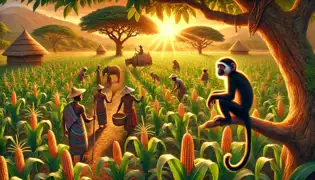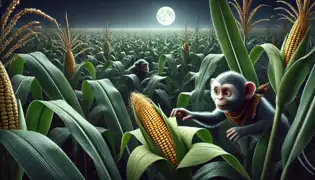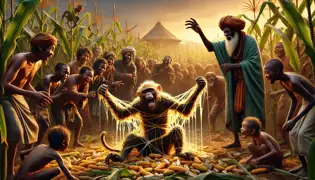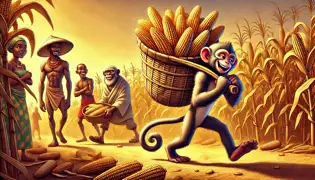The Trickster Monkey and the Cornfields
Reading Time: 7 min

About Story: The Trickster Monkey and the Cornfields is a Folktale from angola set in the Ancient. This Conversational tale explores themes of Redemption and is suitable for All Ages. It offers Moral insights. A mischievous monkey’s tricks lead to an unexpected lesson in redemption and hard work.
In the heart of Angola, where golden cornfields stretched beneath an endless sky, there lived a clever and mischievous monkey named Kanda. While other animals of the land spent their days gathering food or working alongside the villagers, Kanda had no patience for such things. Hard work did not suit him; trickery was far easier.
He found great joy in outsmarting those around him, especially the humans who toiled under the hot sun, planting and harvesting their precious maize. Each night, when the village fell silent, Kanda would creep into the cornfields, his eyes gleaming with excitement as he filled his belly with the stolen harvest.
But greed has its limits, and fate has its own way of teaching lessons. The very land Kanda had been stealing from would soon rise against him, setting him on a path he never could have imagined.
The village of Mbanza lay nestled between two great rivers, its people known for their skill in farming and storytelling. The land was generous, yielding corn so golden it shimmered beneath the midday sun. Every year, after months of hard work, the villagers would gather for the great harvest festival, a celebration of abundance and community. But this year, something was amiss. "We are losing too much corn," the farmers whispered among themselves. "Every morning, we find our crops missing, our stalks broken." At first, they blamed the birds, then the wild boars that sometimes ventured from the forest. But the village elder, Baba Tembo, had his doubts. "This is no ordinary thief," he said, stroking his graying beard. "This is the work of someone clever… someone who knows how to take without being seen." Kanda, high up in the trees, chuckled as he listened to their worried voices. They had no idea that he was the culprit. Each night, under the cover of darkness, he would sneak into the fields, stuffing his cheeks until they bulged with sweet, juicy corn. But as the villagers grew more determined to catch the thief, Kanda only became bolder. "I am too smart for them," he boasted to himself. "They will never catch me!" Determined to put an end to the theft, the villagers devised a plan. They crafted a scarecrow unlike any other—one coated in the sticky sap of the acacia tree, its body dressed in the garments of a farmer. They placed it in the very heart of the cornfield, knowing that the thief would return. That night, as Kanda swung down from the treetops, he noticed the new figure standing among the stalks. He hesitated. "A farmer? At this hour?" For a brief moment, he considered leaving. But then his hunger overpowered his caution. "No farmer would stand so still in the dark," he muttered. He approached the figure, eyes narrowing. "You think you can scare me?" With a confident smirk, he reached out and poked the scarecrow. His fingers stuck. "What is this?" He yanked his hand, but the sticky sap held firm. Panicked, Kanda kicked the scarecrow, only for his foot to become trapped as well. He struggled, twisted, and turned, but the more he fought, the tighter the trap held him. By the time dawn broke, the villagers arrived to find Kanda dangling helplessly from the scarecrow, his fur matted with sap, his face frozen in an expression of utter disbelief. Laughter rippled through the crowd. "So, it is you, Kanda!" Baba Tembo chuckled. "The trickster caught in his own game." The villagers cheered, delighted to finally see the mischievous monkey brought to justice. Realizing that he had no escape, Kanda did the only thing he could—he begged. "Oh, great Baba Tembo!" he cried. "I have been foolish! Please, let me go, and I promise never to steal again!" The villagers, still laughing, debated his fate. "He has troubled us for too long," one man said. "Let us send him far away so he never bothers us again!" "No," a woman argued. "What if he tricks another village? We must punish him properly!" But Baba Tembo had been watching Kanda closely. Despite his mischief, the old man saw something in the monkey’s eyes—something more than just greed. "A thief steals because he does not know the value of work," Baba Tembo said. "If Kanda is to learn his lesson, he must work for his food like the rest of us." And so, instead of banishing him, the villagers made Kanda a deal—he would stay, but he had to help tend the fields. For the first time in his life, Kanda was given a job. At first, Kanda struggled. He had never worked before. His hands ached from planting seeds, his back hurt from bending over, and his fur itched from the sun's heat. "This is terrible!" he groaned. "Why do humans choose to live this way?" But slowly, something changed. As the days passed, Kanda began to notice things he never had before—the way the soil felt cool and soft beneath his fingers, the satisfaction of seeing tiny green sprouts push through the earth, the joy in the villagers’ eyes when the first harvest came. And for the first time, he felt something he had never known before—pride. The villagers, too, began to change. At first, they had treated Kanda with suspicion, watching his every move. But as they saw him working alongside them, their attitudes softened. One day, a young boy named Simão decided to test Kanda’s honesty. He placed a basket of maize near the edge of the field and hid behind a tree, watching. Kanda spotted the basket and hesitated. He could easily take it. No one would know. But then he thought of Baba Tembo, of the villagers who had trusted him, of the crops he had worked so hard to grow. Taking a deep breath, he picked up the basket and carried it to the village. "Someone left this behind," he said. Murmurs of surprise spread through the crowd. Baba Tembo smiled. "Kanda, the trickster, has become the protector." Seasons passed, and Kanda’s name became known across the land—not as a thief, but as a guardian of the fields. The villagers no longer feared his mischief; instead, they relied on him to chase away real pests. One evening, as the sun dipped below the horizon, Baba Tembo gathered the villagers together. "We have all learned something from Kanda," he said. "That even the cleverest trickster can change, that wisdom is greater than greed, and that hard work will always be rewarded." Kanda sat beside the elder, no longer the mischievous thief he had once been, but a part of the village—a friend, a protector, and a symbol of redemption. And so, the legend of Kanda, the trickster-turned-guardian, lived on in the stories of the elders, a tale whispered under the glow of the harvest moon, reminding all who heard it that even the cleverest thief could find a new path. This Angolan folktale teaches us that trickery may bring temporary rewards, but true happiness and respect are earned through hard work and honesty. It reminds us that change is always possible and that even the most mischievous heart can find a new purpose. And so, beneath the warm Angolan sky, the golden cornfields stood tall—not just as a source of food, but as a symbol of trust, transformation, and the power of second chances.The Monkey’s Mischief

The Farmer’s Trap
The Monkey’s Plea

A Trick Reversed

The Legend of the Trickster Monkey

Moral of the Story
The End.

















